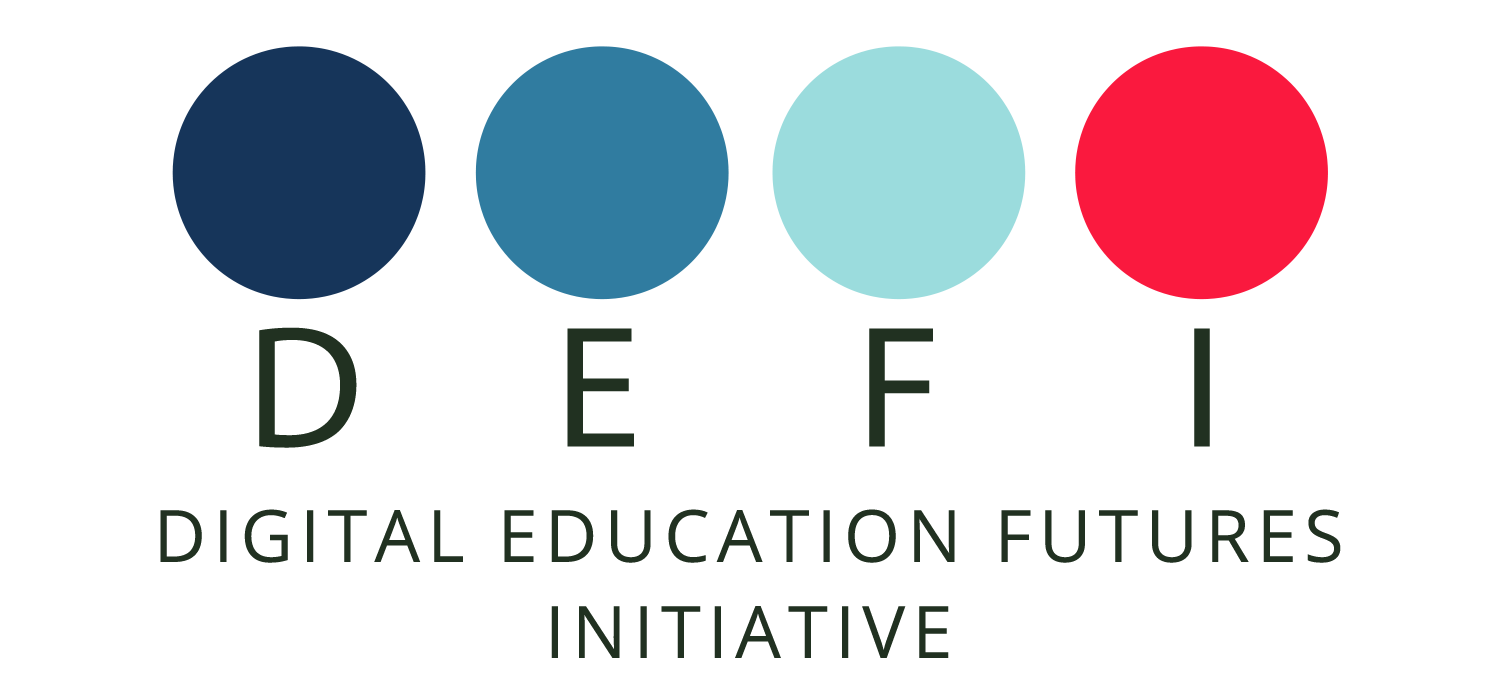Why we need the Digital Education Futures Initiative
Some people claim that technology should not drive what we do in education. Technology they say, is just a tool to help us deliver the curriculum. These people have short memories. Schools first came into being around 3000 BCE to teach the new technology of recording and retrieving meanings by incising patterns in clay tablets. Around 400 BCE Socrates complained about the damaging educational effects of the then still relatively new technology of literacy at a time when it was spreading throughout ancient Greece. It is impossible to imagine the contemporary mass system of schooling, so similar everywhere you go in the world, without the invention of the printing press that provides the books this system is based upon.
Technology has always been at the heart of education
The central role of technology to education becomes evident when we look at cultures where print literacy and numeracy are not the norm. Oral cultures also have education but they do it differently. In oral cultures young people are guided into communities of practice through talk and action, and they are also often initiated into their long term culture, learning how to walk with the ancestors and how to talk with the ancestors.
Thinking about how much of our current education system is entangled with the affordances and the needs of print literacy is relevant now precisely because we are currently undergoing a transition in our dominant mode of communication. Every year in every area of life more functions that were once carried by print switch over to the Internet. This shift is potentially just as profound, if not perhaps even more profound, than the earlier shift from oracy to literacy that Socrates complained about.
A transition away from print literacy
At the turn of the current millennium the Internet was just beginning to take off. It had about 400 million users world-wide mostly in the USA and other developed countries. Now it has over 5 billion users, more than half the population of the planet and it is still expanding rapidly. There are over 6 billion smart phone users and most use their smart phones as their main way of accessing the Internet. At first the Internet looked to many like an extension of print literacy supporting text messages that were like paper letters only faster and web-pages that looked like printed posters only more interactive. But the quality of connections on the Internet is evolving fast. In 2000 transmitting a video took hours waiting for the file to download. Last year, in 2021, there were 3.3 trillion zoom calls alone. Live streaming of audio and video data is becoming the new normal. More bandwidth is coming. The metaverse is widely predicted to be the next wave with its promise of embodied live participation in shared immersive worlds.
More from DEFI
Given that the history of education has been entangled with communications technology from the beginning it seems likely that education will change as our communications technologies change. Commentators have predicted this for a while now but, so far, the global print-based education system has remained remarkably resilient. However, using techniques such as scenario planning, when we project ourselves forwards 50 or 100 years it is impossible that education will not change and on most scenarios it will not change just a little but will change more radically.
New educational affordances of digital technology
One possible driver for change is the promise of new kinds of learning offered by digital technologies. Affordances frequently mentioned include: more personalised learning routes taking advantage of all the free open-education resources now available to anyone anywhere who has internet access and a smart-phone; more adaptive learning supported by AI; more participatory peer-to-peer learning in online mediated learning communities (e.g. Scratch) and more immersive learning experiences in shared 3D worlds where education and games converge so as to be hard to distinguish.
The challenges of digital education and technology
Often a more powerful driver for change, however, is fear. Global challenges, often themselves brought about by developments in technology, require educational solutions. The nature of work is being transformed by growth in smart technologies which threaten to make millions of workers redundant. This suggests a need for more lifelong learning, more just-in-time learning and a shift in focus away from things that smart computers can do, like remembering facts, to things that humans still do better than computers, such as wisdom, creativity and dialogue. The Internet itself has become a challenge to humanity. The spread of misinformation and disinformation suggests that people are not using the educational affordances of the Internet well. Education into how to assess information and how to learn together with others constructively online is needed. Concerns about the impact of the Internet on democracy and childhood socialisation are perhaps aspects of a bigger challenge: managing the transition from multiple separate print-based cultures to a single global Internet based culture.
The signs of the times all suggest the need for a step change to become a more intelligently self-regulating planet. New communications technology including the Internet, smart phones and AI might make this step-change possible but technology alone is not sufficient, a transformation in education is also required.
Education is complex. Innovations that look like they ought to work in theory often fail to work in practice for unpredictable reasons. Successful change management requires research. Policy makers, practitioners and industry leaders need evidence-based guidance to support them if they are to implement sustainable change
The need for collaboration
It is probably not a coincidence that the challenges of a transition to the Internet Age in a cultural historical timescale, correspond to an increasing awareness of the dawn of the Anthropocene in a more geological timescale. The Anthropocene is the idea that the Earth has moved into a novel epoch characterized by human domination of the planet. Effects like global warming show that what we humans do is now impacting on the quality of our environment such that collective self-regulation on a planetary scale has become essential if we are to continue not only to thrive but also, perhaps, even simply to survive. The Anthropocene offers challenges to the future that imply the need for humans to learn to collaborate together across different countries and continents in order to understand and to solve complex problems such as global warming, pandemics, conflicts and emigration, water management and many more.
The need for a global Digital Education Futures Institute (DEFI)
DEFI is about mapping the educational logic of the new Internet Age through research that explores the pedagogical affordances of new technologies, which means the new ways of teaching and learning that they make possible for education, ways which were either not possible before or much more difficult to implement before. While some of these affordances have long been noted in the literature, not enough effort has yet been put into research into how they might or might not enable the transformation of education in the future. Design-based research is required that implements these affordances in working models of education into order to rigorously investigate their consequences.
DEFI is about mapping the educational logic
of the new Internet Age through research that explores
the pedagogical affordances of new technologies
Some of the potential affordances of new information and communications technology guiding DEFI investigations are:
- Transcending the constraints of physical location: do we need bricks and mortar schools and universities, or could we manage with online educational communities? What are the problems with web-based education and can we design new models that overcome some of these problems?
- Radically differentiated learning trajectories: Can individuals be supported by technology to pursue unique educational journeys? What are the necessary pre-conditions and supports required for this kind of self-directed learning? What are the consequences?
- Just-in-time lifelong learning: Can education be integrated into the worlds of work, leisure and citizenship in a way that removes the need for separate educational institutions? What kind of educational eco-systems would be required to realise this vision in whole or in part and are such systems sustainable?
- Experiential learning in immersive shared worlds: are massive multi-user online role-play games an effective way to learn a new challenge-based global curriculum? Can all learning be fun?
- Learning as networking: can guided dialogue in online social media sites be the basis for the next global education system?
These are just a few of the questions that urgently need to be researched if we are to have the evidence we need to inform design of the future of education.
The role of DEFI
One year after our launch in 2021 DEFI already fulfils a number of functions contributing to its mission of providing research support guiding more intelligent changes in educational practice:
- Investigating new models of education by design-based research, for example; Camtree, an online-mediated teacher research exchange; WoW Scenarios, virtual internship games supported by enterprises that can give young people a taste of the World of Work and Cambridge OWL, a global web to support young people working together across different cultures as they learn how to tackle some of the global challenges that face humanity.
- Building a global community of stakeholders (including academia, education, policy, and industry) to explore and develop new models of education and new research priorities arising due to the growing prevalence of digital technology.
- Supporting a network of like-minded changemakers in Cambridge University and its associated eco-system to provide opportunities for collaboration, integration and joint action.
- Working with partners like the Dipont Education, Arm Education, Cambridge Partnerships for Education (CPE), the College of Education for the Future in Zhuhai, China and the Centre for Future Studies, Dubai, to provide research support for policy-makers and practitioners around the world interested in exploring new models of education.
- Offering social enterprise education and support for Cambridge based education initiatives that spin-off from research.
- Conducting evidence mapping, horizon scanning and future scoping to analyse emerging trends, anticipate their impact and explore new models of education that may have a ‘real world’ impact.
The digital transformation of the world is happening whether people want it or not. Education is the best way to help young people handle this transformation. Establishing a Digital Education Futures Institute at Cambridge is about providing a space of reflection and research to enable policy-makers, practitioners and industry leaders in the field of education to base their decisions on the best evidence available. DEFI wants to provide the intelligence and thought-leadership needed to manage the inevitable transition from an increasingly inadequate global education system based on the technologies of the past to a more intelligent global education system, one that provides better support for the shared project of collective human flourishing.

Rupert Wegerif
DEFI Director
Rupert Wegerif is a professor in the Faculty of Education at the University of Cambridge and director of the Digital Education Futures Initiative at Hughes Hall, Cambridge. He is the author of several influential books and articles in the area of educational theory, educational psychology and education with technology. He offers a new approach to education for the Internet Age: education as expanding dialogic space.



0 Comments